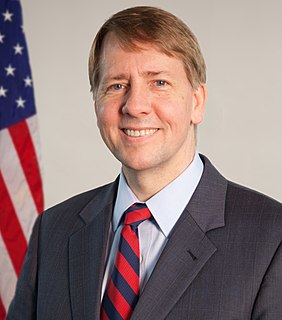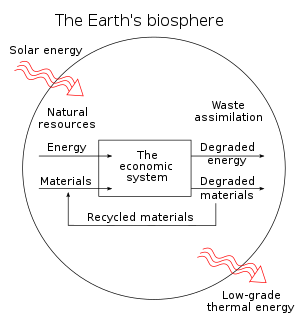A Quote by Aleksandr Solzhenitsyn
Society must cease to look upon 'progress' as something desirable. 'Eternal Progress' is a nonsensical myth. What must be implemented is not a 'steadily expanding economy', but a zero growth economy, a stable economy. Economic growth is not only unnecessary but ruinous.
Related Quotes
Growth is the mantra of our society because the economy can't remain healthy without growth.Impregnable monopolies aside (and these are few), profits are both the hallmark of capitalism and its Achilles heel, for no business can permanently maintain its prices much above its costs. There is only one way in which profits can be perpetuated; a business-or an entire economy-must grow.
The economy has settled into a sustainable, self-reinforcing growth path, .. All major categories of the economy have contributed to economic growth. Now that businesses have begun to add to payrolls, the current expansion is self-reinforcing. Only external shocks, such as terrorist attacks or a surge in oil prices, could derail the recovery.
Inflation is certainly low and stable and, measured in unemployment and labour-market slack, the economy has made a lot of progress. The pace of growth is disappointingly slow, mostly because productivity growth has been very slow, which is not really something amenable to monetary policy. It comes from changes in technology, changes in worker skills and a variety of other things, but not monetary policy, in particular.
To change our national economic story from one of financial speculation to one of future growth, we need a third industrial revolution: a green revolution. It will transform our economy as surely as the shift from iron to steel, from steam to oil. It will lead us toward a low-carbon future, with cleaner energy and greener growth. With an economy that is built to last - on more sustainable, more stable foundations
The impact of QE on generating more lending by Wall Street to Main Street and in generating more employment and increasing overall investment in the economy is quite modest. QE probably limited the initial collapse of the economy in 2008, and likely had a very small positive impact on economic growth, but its broader impact on jobs and growth in the economy seems not very big.
Our economy will not prosper as long as it is monopolised (by the government). The economy must be rid of monopoly and see competition, it must be freed of insider speculation, be transparent, all people must be aware of the statistics. If we can bring transparency to our economy, we can fight corruption.
The problem is, if at all, in the different view of the economy, of economic growth. Growth is too low, even for us. That needs to change: More investments, a stronger role by the European Central Bank. Otherwise, there are no tensions between Italy and Germany. But on this point, compromises must be reached and we will reach them.
Health care is in as bad a shape as it has ever been after eight years of Barack Obama and the Democrat Party running it and running the US economy. It's an absolute disaster. Other areas of the economy are a disaster. Economic growth? There isn't any. It's 1% per quarter, a 4% growth rate per year if we're lucky. There is no expansion. There is no productivity increase.
Addressing the climate and biodiversity crises requires us to radically change our economic models, moving away from economic growth as the over-riding measure of progress and moving instead towards improving health and wellbeing for people and nature. That means a different economic model taking us towards a sustainable economy.







































